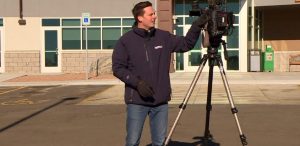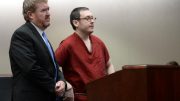By Lucy Haggard
CFOIC Contributor
Reporting a story on the Park County sheriff last month, 9NEWS journalists Noel Brennan and Bryan Wendland were told they couldn’t bring their cameras into a county commissioners’ meeting that was open to the public.
The cameras would be a “disruption,” Park County Commissioner Mike Brazell said. They would encourage “grandstanding,” County Attorney Erin Smith told the reporters.
Only one other individual attended the meeting, which the county audio recorded. Brennan and Wendland were allowed to ask questions about the now-former sheriff during the public comment period, but when they obtained a copy of the audio, their questions weren’t audible.
Brennan expressed some frustration in a tweet: “Today, @ParkCounty barred us from filming a public county commissioners meeting & charged us $5 for an audio recording of said meeting. After listening to the CD, it appears they never turned on my microphone when I asked commissioners questions during public comment.”
9NEWS reporter Jeremy Jojola followed up with an on-air commentary. A week later, on Dec. 20, he and a 9NEWS crew attended another Park County Commission meeting at which they were allowed to record video and audio.
“I think the fact that we made some noise about it caught their attention and made them realize they didn’t handle it correctly,” Jojola told the Colorado Freedom of Information Coalition. He said that in his career as a journalist, he had never experienced public officials not wanting a public meeting recorded.
The commissioners said they support an open and free press. Commissioner Dick Elsner told CFOIC that commission meetings recently had moved from a very small room to the current one, which is more spacious. Elsner noted that because the previous room was so small, cameras took up too much space and were disruptive, and since moving to the new room, they “hadn’t thought it through” because no one else had wanted to put up a camera.
Regardless of the intent, were the actions of the Park County commissioners legal? Is there a difference between what journalists can do versus ordinary citizens? With portable video and audio recorders in the pockets of most people, how will situations like this be mediated in the future? The short answer: It’s complicated but becoming clearer.
CFOIC President Steve Zansberg, a First Amendment attorney, noted that the Colorado Open Meetings Law is silent on whether the public can record a public meeting. However, multiple couple court cases have set a precedent to allow recording, and other states have recognized the public’s right under the First Amendment to record video or audio of public meetings that are on public property and concern a public interest.
One of the most clarifying court cases is Tarus v. Borough of Pine Hill, decided by the Supreme Court of New Jersey in 2007. The case determined that there is a common law right for individuals to videotape municipal council meetings. “Our conclusion is supported by an interwoven tapestry of jurisprudence and policy that demonstrates both the value of open government and the right to document governmental proceedings,” the New Jersey justices wrote.
The Tarus case does note that there can be reasonable restrictions on when or how videotaping can occur at public meetings. Zansberg said that these time, place and manner restrictions must be drawn up narrowly, so as to burden as little speech as possible. If a restriction is placed, it must apply equally to everybody and every meeting, not just to certain individuals or certain meetings. For example, it’s reasonable to request that someone record from the side or back of the room instead of the middle, so that audience members’ view isn’t blocked.

But the explanation given to the 9NEWS crew that a camera’s presence would cause “grandstanding” is “frankly silly, and not a significant government interest,” according to Zansberg. “It’s more easily addressed by telling people not to grandstand. Or give people warnings and ask them to leave the podium if they’re doing that.”
Zansberg said a blanket ban on all recording in a public meeting would likely be ruled unconstitutional if were challenged in Colorado courts because a ban wouldn’t serve a significant governmental or public interest. If a specific time, place and manner restriction were placed by a public body, it would have to apply to anyone recording a meeting, not just journalists, and any sort of equipment, including camera phones. Many public meetings are video recorded by the government itself and either live streamed or uploaded after the fact, which Zansberg applauded.
“It’s 2019. It’s about time that the people in our state have ready access to governmental proceedings,” Zansberg said.
The rules are notably different for court proceedings. The U.S. Supreme Court doesn’t allow for cameras, even in oral arguments, and federal courts have upheld blanket bans on cameras in other courtrooms. In Colorado, judges can limit the use of cameras and recording equipment in courtroom sessions that are open to the public.
Although the Park County commissioners’ blanket ban on cameras may not have been explicitly illegal – at least in the context of their previous, smaller meeting room – Jojola commended their decision to walk it back.
“It was a practice in transparency and democracy and pushing back for what we felt could have been a violation of the law at the time,” Jojola said.
Lucy Haggard is a student at the University of Colorado who served as editor of the CU Independent.
Follow the Colorado Freedom of Information Coalition on Twitter @CoFOIC. Like CFOIC’s Facebook page. Do you appreciate the information and resources provided by CFOIC? Please consider making a tax-deductible donation.




